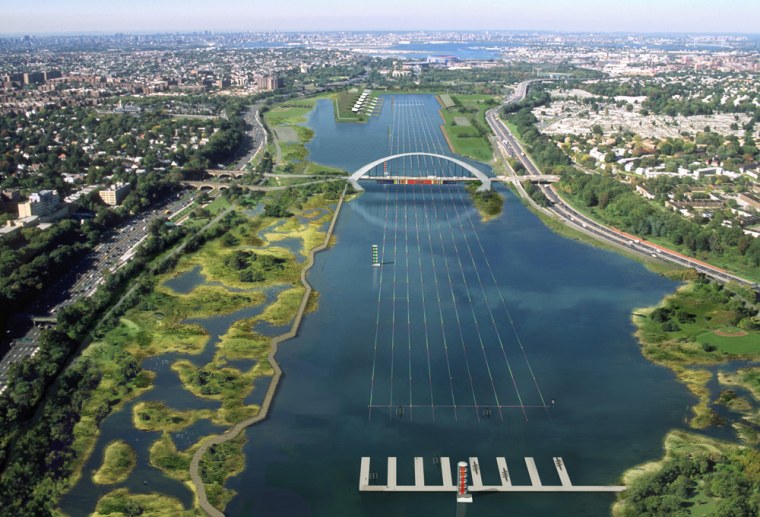New York City’s bid to host the 2012 Summer Olympics, once considered a long shot, gained momentum after the 9/11 terrorist attacks and now ranks among the finalists for the games, which will be awarded in July 2005.
The bid is a complex and ambitious plan to reshape large sections of the nation’s biggest city and has sparked some local opposition that could be a handicap with some members of the International Olympic Committee. And many members may be reluctant to send the Olympics to the United States for a third time in 16 years. But the bid is well-financed and backed by powerful political and business leaders, and will be the focus of intense activity at least until next May, when the field of five candidate cities could be narrowed further.
“I think their bid is just as serious as can be,” said Dick Yarbrough, director of communications for the group that hosted the 1996 games in Atlanta, “There would, I think be some sympathy for them getting the games because of where they’ve been and where they’ve come from.” But he said the city also will have to fight against anti-U.S. bias among some members of the 124-member IOC.
New York, of course, is not relying on a sympathy vote. The heart of the bid, and the element that has stirred up the most controversy, is a $5 billion complex proposed for the West Side of Manhattan that would include a football stadium and would expand the capacity of the city’s convention center. The bid committee also envisions a $1.5 billion housing project along the East River in Queens that would be converted to 4500 units of housing after the games.
Including a costly subway extension, development of a media center and the normal costs associated with operating the games, bid opponents reckon the total price tag on a winning bid would approach $12 billion. Bid committee officials use a far lower figure.
In any event the project is manageable for a city that enjoys $13 billion in public and private capital investment each year, said Deputy Mayor Dan Doctoroff, who is leading the bid effort. In relative terms, the capital investment required is a “very, very low amount,” he said in an interview.
Critics of the bid say its reliance on several large new developments, including the West Side stadium, flatly ignores the IOC’s latest push for “sustainable development,” which emphasizes that existing facilities should be used whenever practical.
“The current bid is a lot of white-elephant venues and a big mistake,” said Brian Hatch, a New York-based consultant and former deputy mayor of Salt Lake City. He recommends refocusing the city’s bid on venues in Queens, a highly diverse and less well-known section of New York that could get a huge boost from the games.
“I think Queens residents would probably jump at the opportunity to host,” he said. “Manhattan, on the other hand, would be an indifferent host at best, and possibly outright hostile in certain neighborhoods.”
Doctoroff says the Olympics would act as a catalyst to develop neighborhoods and facilities in Manhattan, Queens and elsewhere, with lasting benefits for the city. Moreover, an analysis commissioned by the bid group figures winning the games would generate nearly $11 billion in added economic activity and 116,000 “person-years” of employment over 17 years.
“Hosting the 2012 Olympic Games would generate a major increase in employment during the games year, but it would also generate thousands of new jobs in the years leading up to the Games and in the decade that follows,” according to the preliminary report on economic impact.
Such reports commonly overstate the benefits and understate the costs associated with sports mega-projects, said Rob Baade, an economist at Lake Forest College in Chicago who specializes in sports issues.
He said cities have become increasingly aggressive about chasing the Olympics and other events even though the economic benefits are not well-documented and might be marginal.
“They are looking for everything they possibly can to induce increases in economic activity,” he said.
Baade, who favors a permanent location for the Olympics, was particularly critical of New York’s plan to spend $600 million in public money on the West Side stadium, which will become the permanent home for the New York Jets football team, which currently plays in New Jersey.
“I think it’s incredibly risky to spend public money on the stadium in the hopes you attract the Olympic Games — that’s putting the cart way before the horse,” he said.
Doctoroff said construction on the stadium project is scheduled to begin next year, before the vote on the 2012 site for the games. And he said the building will feature a retractable roof, moveable seats, movable lighting and even a removable field that will allow it to be used for conventions and other events 300 days a year.
“Every single one of the things that we’ve done is really consistent with the IOC edict that these things have to have productive uses after the Olympics,” he said.
